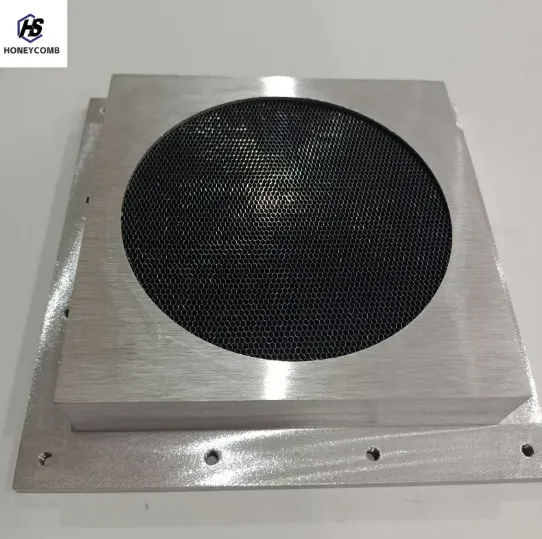
- Afrikaans
- Albanian
- Amharic
- Arabic
- Armenian
- Azerbaijani
- Basque
- Belarusian
- Bengali
- Bosnian
- Bulgarian
- Catalan
- Cebuano
- China
- China (Taiwan)
- Corsican
- Croatian
- Czech
- Danish
- Dutch
- English
- Esperanto
- Estonian
- Finnish
- French
- Frisian
- Galician
- Georgian
- German
- Greek
- Gujarati
- Haitian Creole
- hausa
- hawaiian
- Hebrew
- Hindi
- Miao
- Indonesian
- Italian
- Japanese
- Javanese
- Malay
- Persian
- Portuguese
- Punjabi
- Russian
- Spanish
- Swahili
- Telugu
- Vietnamese

Optimizing Airflow with Advanced Honeycomb Ventilation Solutions
Honeycomb vents have become a staple in modern ventilation systems, offering an innovative solution to air circulation in a wide range of applications. Their unique design, featuring a cellular structure, not only allows for efficient airflow but also provides resistance to debris, insects, and water infiltration. These vents are particularly effective in environments where high airflow is essential, such as in industrial settings, power plants, or even residential spaces requiring effective ventilation.

La uzo de mielĉelaraj ellastruoj extends beyond simple air circulation. Their precise construction enhances energy efficiency by facilitating better airflow control, reducing the need for energy-intensive cooling or heating systems. As the airflow is evenly distributed, the need for additional mechanical air movement systems is minimized, ultimately cutting down on operational costs while maintaining an optimal climate inside buildings.
Honeycomb Soffit Vents: Protecting Roof Spaces and Enhancing Airflow
One of the key applications of honeycomb ventilation is in honeycomb soffit vents. These specialized vents are installed in roof eaves to ensure that attic spaces remain properly ventilated. By promoting passive airflow, honeycomb soffit vents help to regulate the temperature and humidity levels in attics, reducing the risk of mold growth, condensation, and structural damage caused by trapped moisture.
The unique design of honeycomb soffit vents provides superior airflow while blocking insects and debris from entering the attic, ensuring that the ventilation system remains unobstructed and effective over time. Additionally, their aesthetic appearance blends seamlessly into the exterior of the building, providing a functional solution without compromising the overall design.
Enhancing Durability with Honeycomb Vent Covers
To ensure the long-term effectiveness of mielĉelaraj ellastruoj, many systems incorporate honeycomb vent covers. These covers provide an extra layer of protection against environmental elements such as rain, snow, and wind, helping to prevent debris from clogging the vent openings. Made from durable materials like stainless steel, aluminum, or plastic, these covers ensure that the venting system remains intact, even in harsh weather conditions.
Honeycomb vent covers also add an aesthetic touch to the vent system, offering various designs and finishes that can match the architectural style of the building. Whether used for industrial applications or residential projects, they are designed to protect the internal components of the ventilation system without compromising the performance or airflow of the vent itself.
Vented Aluminum Honeycomb: Lightweight, Strong, and Efficient
Another notable application of honeycomb technology is in the use of vented aluminum honeycomb. This material is widely used in aerospace, automotive, and architectural industries due to its combination of light weight, strength, and exceptional durability. In ventilation systems, vented aluminum honeycomb provides a lightweight alternative to traditional materials while maintaining high structural integrity and excellent airflow properties.
The honeycomb structure of vented aluminum honeycomb is engineered to withstand harsh conditions, providing both thermal and acoustic insulation. Its excellent strength-to-weight ratio makes it ideal for use in environments where space and weight are limited, such as in aircraft cabins or vehicles. Furthermore, its design allows for the effective dissipation of heat, making it a valuable material in high-temperature applications.
Honeycomb Ventilation Systems for Optimal Airflow
Honeycomb ventilation systems offer a combination of effective airflow, energy efficiency, and environmental protection. The honeycomb structure ensures that air moves smoothly through the system while maintaining a balance between airflow volume and resistance. Whether used in commercial, residential, or industrial applications, honeycomb ventilation systems help maintain healthy indoor air quality by promoting consistent airflow without requiring excessive energy consumption.
La uzo de honeycomb ventilation is not limited to just passive air movement; it can also be integrated with mechanical ventilation systems to enhance airflow performance. By using honeycomb materials in ventilation panels, ducts, and diffusers, designers can create a system that maximizes airflow efficiency while minimizing the footprint of the components.
Honeycomb vent FAQs
What are the main advantages of using honeycomb vents in building designs?
Honeycomb vents offer several advantages, including enhanced airflow, energy efficiency, and protection from debris and insects. Their design allows for optimal ventilation while minimizing the need for additional mechanical air movement systems.
How do honeycomb soffit vents help in attic ventilation?
Honeycomb soffit vents help regulate attic temperature and humidity, preventing mold growth and structural damage caused by trapped moisture. They promote passive airflow while blocking debris and insects, ensuring long-term effectiveness.
What materials are used in honeycomb vent covers?
Honeycomb vent covers are typically made from durable materials such as stainless steel, aluminum, or plastic. These materials provide protection against environmental elements like rain and wind, helping to maintain the vent system's performance.
Why is vented aluminum honeycomb ideal for ventilation systems?
Vented aluminum honeycomb is lightweight, strong, and highly durable, making it ideal for use in ventilation systems. Its exceptional strength-to-weight ratio and thermal resistance make it perfect for applications in harsh conditions.
How does honeycomb ventilation improve indoor air quality?
Honeycomb ventilation systems improve indoor air quality by promoting consistent airflow and minimizing energy consumption. They provide an efficient solution for maintaining healthy air quality without the need for excessive mechanical systems.
Kategorioj de produktoj
-
Why Vented Aluminum Honeycomb Is Leading the Way in Shielding and Ventilation SolutionsNovaĵojJul.18,2025
-
Why Stainless Steel Honeycomb Panel is the Ultimate Choice for High-Tech Shielding and ProtectionNovaĵojJul.18,2025
-
Why Honeycomb Strips Are Revolutionizing High-Speed Sealing SolutionsNovaĵojJul.18,2025
-
Shielded Glass Innovation Powers the Future of Electromagnetic ProtectionNovaĵojJul.18,2025
-
Precision Starts Here: Revolutionizing Airflow Control with Honeycomb Wind Tunnel SolutionsNovaĵojJul.18,2025
-
Elevate Industrial Performance with Precision-Engineered Steel Honeycomb Core SolutionsNovaĵojJul.18,2025
-
Vented Aluminum Honeycomb: A Smart Shield for Airflow and EMI ControlNovaĵojJul.11,2025















